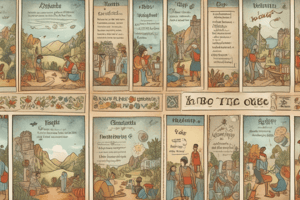Podcast
Questions and Answers
What is the English translation of 'rubio/a'?
What is the English translation of 'rubio/a'?
- brunette
- blond (correct)
- nervous
- silly
Which word translates to 'to go out' in English?
Which word translates to 'to go out' in English?
- mirar
- salir (correct)
- nadar
- vivir
What does 'la televisión' mean in English?
What does 'la televisión' mean in English?
- video
- radio
- television (correct)
- broadcast
Which of the following means 'nephew' in English?
Which of the following means 'nephew' in English?
What is the English word for 'la tarea'?
What is the English word for 'la tarea'?
Which of the following terms describes someone who is unoccupied?
Which of the following terms describes someone who is unoccupied?
What is the Spanish term for 'grandmother'?
What is the Spanish term for 'grandmother'?
Which adjective is used to describe someone who is selfish?
Which adjective is used to describe someone who is selfish?
Which of the following words means 'ugly'?
Which of the following words means 'ugly'?
What does the verb 'cantar' translate to in English?
What does the verb 'cantar' translate to in English?
Which option refers to a family member who is a son?
Which option refers to a family member who is a son?
What is the translation of 'caliente'?
What is the translation of 'caliente'?
Which adjective means 'tired'?
Which adjective means 'tired'?
Flashcards are hidden until you start studying
Study Notes
Vocabulary Overview
- Various words reflect familial relationships, including el abuelo (grandfather), la abuela (grandmother), el hermano (brother), and la hermana (sister).
- Adjectives describing physical attributes include alto/a (tall), bajo/a (short), gordo/a (fat), and delgado/a (thin).
Emotions and States
- Emotions are expressed with words like contento/a (happy), aburrido/a (bored), cansado/a (tired), triste (sad), and nervioso/a (nervous).
- Physical states include enfermo/a (sick) and ocupado/a (busy).
Useful Verbs
- Common action verbs include bailar (to dance), cantar (to sing), escuchar (to listen), comprar (to buy), and vivir (to live).
- Sports-related verbs are jugar (to play) and nadar (to swim).
Descriptive Adjectives
- Attractive adjectives: bonito/a (pretty), feo/a (ugly), guapo/a (handsome), and loco/a (crazy).
- Adjectives for taste and quality include bueno/a (good), malo/a (bad), difícil (difficult), and fácil (easy).
Nouns Related to Daily Life
- Common nouns: la casa (house), la familia (family), la playa (beach), el béisbol (baseball), and el fútbol (soccer).
- Terms related to technology: la radio (radio), la televisión (television), and el video (video).
Miscellaneous
- Possessive terms include mi (my), tu (your), su (his, her), and nuestro/a (our).
- Frequent adverbs: siempre (always), nunca (never), and mucho/a (a lot).
Key Relationships
- Phrases for family relationships: el esposo (husband), la esposa (wife), el primo (cousin), el tío (uncle), la tía (aunt).
Language Constructs
- Common phrases using gustar (to like), such as "quiero" (I love) for expressing affection.
- Expressions of demand or necessity with hay (there is/are) and quiero in simple sentences.
Studying That Suits You
Use AI to generate personalized quizzes and flashcards to suit your learning preferences.




